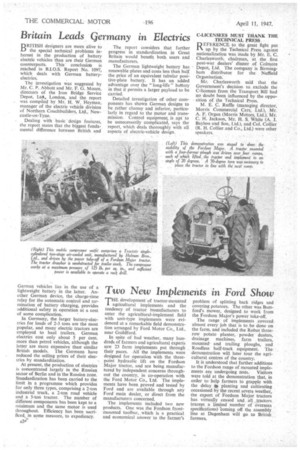Britain Leads Germany in Electrics
Page 28

If you've noticed an error in this article please click here to report it so we can fix it.
DRITISH designers are more alive to
the special technical problems inherent in the production of battery electric vehicles than are their German counterparts. This conclusion is reached in B.I.O.S. Report No. 1097, which deals with German battery. electrics.
The investigation was suggested by Mr. C. P. Abbott and Mr. F. G. Moore, directors of the Iron Bridge Service Depot, Ltdb.„ London, and the report was compiled by Mr. H. W. 1-leyman, manager of the electric vehicle division of Northern Coachbuilders, Ltd., Newcastle-on-Tyne.
Dealing with basic design features, the report states that the biggest fundamental difference between British and German vehicles lies in the use of a lightweight battery in the latter. Another German device, the charge-time relay for the automatic control and termination of battery charging, provides additional safety in operation at a cost of some complication.
In Germany, the larger battery-electries for loads of 2-3 tons are the most popular, and many electric tractors are employed to haul trailers. German electrics cost only about 5 per cent. more than petrol vehicles, although the latter are more expensive than similar British models. The Germans have reduced the selling prices of their electries by standardization.
At present, the production of electrics is concentrated largely in the Russian sector of Berlin and in the Russian zone. Standardization has been carried to the limit in a programme which provides for only three. types, comprising a 2-ton industrial truck, a 2-ton road vehicle and a 5-ton tractor. The number of different components has been kept to a minimum and the same motor is used throughout. Efficiency has been sacrificed, in some measure, to expediency.
A2g‘ The report considers that further progress in standardization in Great Britain would benefit both users and manufacturers.
The German lightweight battery has renewable plates and costs less than half the price of an equivalent tubular positive-plate battery. It has an added advantage over the " Iong-life " battery in that it perrnits a larger payload to be carried.
Detailed investigation of other components has shown German designs to be rather clumsy and inferior, particularly in regard to the motor and transmission. Control equipment, is apt to be unnecessarily complicated, says the report, which deals thoroughly with all aspects of electric-vehicle design. C-LICENSEES MUST THANK THE TECHNICAL PRESS EFERENCE to the great fight put 1N. up by the Technical Press against nationalization was made by Mr. E. C. Charlesworth, chairman, at the first post-war dealers' dinner of Colmore Depot, Ltd. The company is Birmingham distributor for the Nuffield Organisation: Mr. Charlesworth said that the Government's decision to ,exclude the C-licensee from the Transport Bill had no doubt been influenced by the opposition of the Technical Press.
M. E. C. Ruffle (managing director, Morris Commercial Cars, Ltd.), Mr. A. F. Organ (Morris Motors, Ltd.), Mr. C. H. Jackson, Mr. H. S. White (A. J. Bayless and Son, Ltd.), and Col. Collier (R. H. Collier and Co., Ltd.) were other speakers.




































































